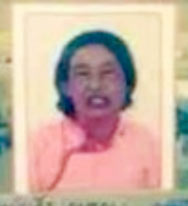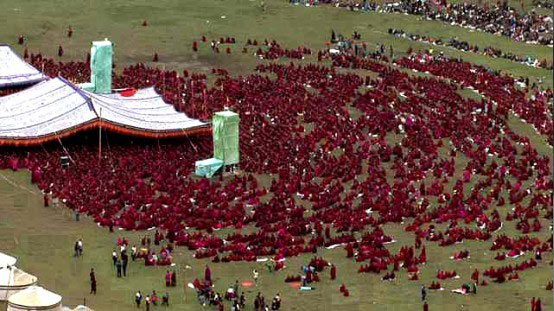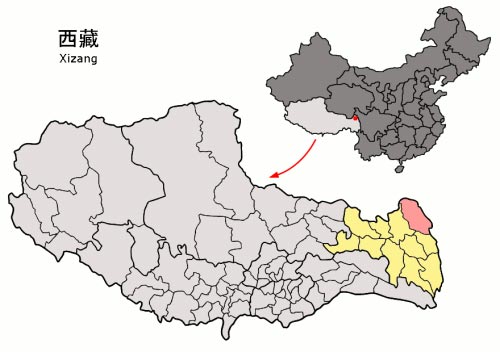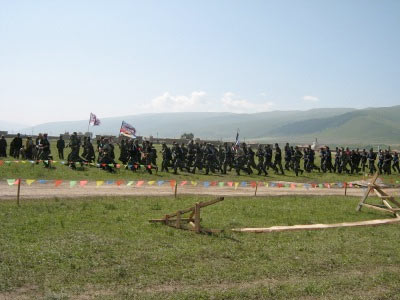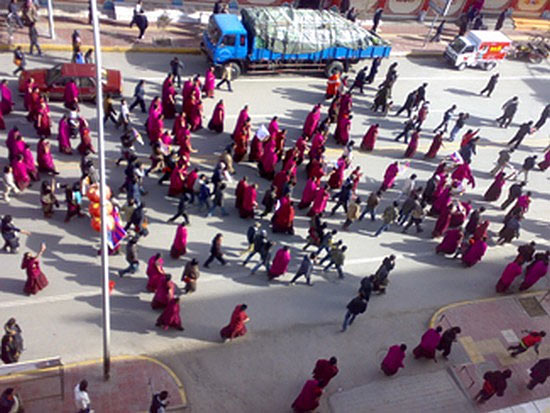Tibetan father of four self-immolates after oppressive measures to prevent Dalai Lama birthday celebrations
May 21, 2015
A Tibetan father of four set fire to himself in Tawu apparently in response to tightened security in the buildup to the Dalai Lama’s 80th birthday. Tenzin Gyatso, the fourth Tibetan to self-immolate this year, was taken away by armed police and it is not known if he is still alive. He set fire to himself outside a government building where political education was carried out, according to Tibetan sources.
Tenzin Gyatso’s self-immolation yesterday (May 20) followed an intense paramilitary buildup in Tawu (Chinese: Daofu), Kardze (Chinese: Ganzi), Sichuan, apparently linked to the authorities’ efforts to prevent any celebrations of the Dalai Lama’s upcoming 80th birthday on July 6.
Since 2008, security forces in Tawu have responded harshly to peaceful expressions of dissent and gatherings of Tibetans for cultural and religious purposes. Two years ago, police in Tawu opened fire on Tibetans peacefully celebrating the Dalai Lama’s 78th birthday, injuring at least ten people. Other Tibetans detained were tortured in custody.
The March 10 anniversary: International Campaign for Tibet stands in solidarity with Tibetans
March 9, 2015
March 10, 2015 is the 56th anniversary of the Tibetan Uprising leading to the Dalai Lama’s flight into exile in 1959, and the seventh anniversary of an unprecedented wave of protests which swept through Tibet, only to be met by a violent crackdown. This year’s March 10 anniversary has a particular resonance as the Dalai Lama’s will turn 80 this year, a moment of particular significance to Tibetans.
Matteo Mecacci, President of the International Campaign for Tibet (ICT), said: “On March 10, 1959, Tibetans rose up as one to oppose China’s occupation and demand the right to determine their own affairs. Fifty-six years later, the situation in Tibet has only worsened. Security has been heightened dramatically in Tibet with massive military deployments, military drills, and police checkpoints with fire trucks standing by in case of self-immolations. Even so, with an unquenchable spirit, the people of Tibet have demonstrated their determination to express their identity, and the devotion to the Dalai Lama that the Chinese authorities have sought to suppress. At the time of this somber anniversary, we stand in solidarity with Tibetans in Tibet in their quest for freedom and justice.”
Self-immolation and protest in Tibet amid intensified security in buildup to March 10 anniversary
March 9, 2015
- A Tibetan woman in her late forties set herself on fire and died in a village in Ngaba (Chinese: Aba) on the night of March 5, in the first self-immolation in Tibet this year. In a bold protest also in Ngaba on March 8, an 18-year old Kirti monastery monk held a solo demonstration, bearing a portrait of the Dalai Lama, and calling for him to be allowed to return home.
- The protests in Ngaba took place in the context of a charged political environment in the tense buildup to March 10, the sensitive anniversary of Tibet’s national uprising in 1959 and an unprecedented wave of mostly peaceful protests that swept across the Tibetan plateau in 2008. Across Tibet, security was intensified; the authorities in the Tibet Autonomous Region announced a strengthening of ‘counter-terrorist’ measures, while police in other areas were equipped with fire extinguishers in case of self-immolations.
- Despite the heightened security, thousands of Tibetans gathered in different areas of Kham and Amdo last week to mark a Tibetan Buddhist festival. Both Tibetans and the Chinese authorities are aware that this year is the significant 80th birth year of the Dalai Lama; he will be 80 on July 6. According to tradition in the Tibetan area of Amdo, 80th birthday celebrations are particularly important.
- Massed ranks of armed troops gathered in a show of force at the ancient and important Kumbum monastery, Qinghai, during a major prayer festival on March 5.
Substantive debate on Tibet in UK Parliament on Human Rights Day
December 11, 2014
A substantive debate on Tibet took place in Parliament in the UK on December 10, Human Rights Day and the 25th anniversary of the Dalai Lama receiving the Nobel Peace Prize.
The House of Commons debate, opened by MP Fabian Hamilton, who is the chair of the All Party Parliamentary Group for Tibet, was the first debate on Tibet in British Parliament in three years and the second since 2008. As an adjournment debate, the government had a duty to respond and UK Foreign Office Minister Hugo Swire made a statement in response to the MPs, in which he said: “The subject commands such interest right across the House that it deserves rather more than an hour-and-a-half Westminster Hall debate, and it would be good if we could return to the subject.”
EU: Challenge human rights in Tibet during upcoming dialogue with China
December 5, 2014
(Brussels, 5 December 2014) - The European Union (EU) must address the worsening of the human rights situation in Tibet at the upcoming 33rd round of the EU-China human rights dialogue to be held on 8 – 9 December 2014 in Brussels. One day after the dialogue on 10 December, on the occasion of the International Human rights Day and to mark the 25th anniversary of the awarding of the Nobel Peace Prize to the Dalai Lama in 1989, the Tibetan Community in Belgium will hold a demonstration in front of the European Parliament (1 – 3 pm).
The International Campaign for Tibet (ICT) calls upon the EU to raise at the EU-China human rights dialogue, the criminalization measures of self-immolations and “counter-terrorism” campaign in Tibet as well as the increased use of force by the police and violations of freedom of religion.
Blog on Dalai Lama-China talks posted in PRC prompts speculation
September 22, 2014
A substantive anonymous posting on the Chinese blogosphere on the possible return of the Dalai Lama to Tibet was posted on Sina.com in China on September 17, 2014 and taken down the next day after it was viewed by thousands of people.
Although the author or authors were anonymous, and it is not known if the piece was written by individuals in China or outside, the detailed blog (ICT’s English translation is given below) demonstrates an understanding of the issues at stake, such as the Dalai Lama’s wish to go on pilgrimage to the sacred mountain Wutai Shan in China and connect to Chinese Buddhists. The blog made reference to President Xi Jinping’s ‘new message’ on the importance of Buddhism to Chinese culture, which the Dalai Lama has referred to, and recent comments by Politburo leader Yu Zhengsheng that appear to indicate concern on the governance of Tibetan areas.
The Dalai Lama has asserted on several occasions that he would like to make a pilgrimage to Wutai Shan, a Buddhist sacred site in Shanxi, and he stated this again during a meeting with Chinese scholars in Hamburg, Germany, in August.
Discussions on anti-Dalai Lama policy shut down in Qinghai; Kalachakra in Tsolho cancelled
July 24, 2013
- Discussions on an experimental and less hostile policy towards the Dalai Lama appear to have been shut down in the Tibetan area of Tsolho, Qinghai, amid a backdrop of tightening repression in eastern Tibet following a visit by one of China’s top leaders Yu Zhengsheng. The new developments appear to reflect the authorities’ fears over the erosion of their authority as self-immolations continue – most recently an 18-year old monk in Dzoege on July 20 – and as Tibetans take bolder steps to affirm their religious and cultural identity.
- Official notices have been issued in at least two areas emphasizing the Chinese government’s hardline policies against the Dalai Lama, and warning Tibetans that pictures of the Dalai Lama will not be allowed in monasteries. Radio Free Asia also reported searches for Dalai Lama images in people’s cars in the Yushu area of Qinghai. This follows reports of quiet discussions in Tsolho proposing a more nuanced approach to the aggressive campaign against the exiled religious leader that is linked to the self-immolations and is a cause of widespread anguish among Tibetans.
Disaster in Gyama draws attention to impact of mining in Tibet
An avalanche of rock, mud and debris struck one of Tibet’s major mining sites, Gyama copper and gold mine near Lhasa, on [...]
First self-immolation in Tibet Autonomous Region; former monk sets himself on fire
Reports are reaching ICT from exile Tibetans in India about the self-immolation of a former monk in his forties in Chamdo (Chinese: [...]
Tibetan “singing nun” arrives in exile after second period of imprisonment
Palden Choedron, one of the "singing nuns" of Drapchi prison, arrived safely in exile in India on September 1, 2010. (ICT) [...]
Determination to resist repression continues in ‘combat-ready’ Chamdo, frontline of ‘patriotic education’
New reports indicate a continued determination among Tibetans in Jomda (Chinese: Jiangda) county in eastern Chamdo (Chinese: Changdu) prefecture in the Tibet [...]
China’s heavy Olympic footprint on Tibet
Soldiers carry out a mock-protest during training exercises near Tro-Tsuk monastery in Ngaba county, Ngaba TAP, Sichuan province. On the eve [...]
Protests spread throughout Tibet: thousands gather in towns and monasteries; statement of Dalai Lama’s Special Envoy
Protests near Labrang Monastery on March 14, 2008. (TCHRD) An unprecedented wave of protests swept monasteries and towns in eastern Tibet [...]


